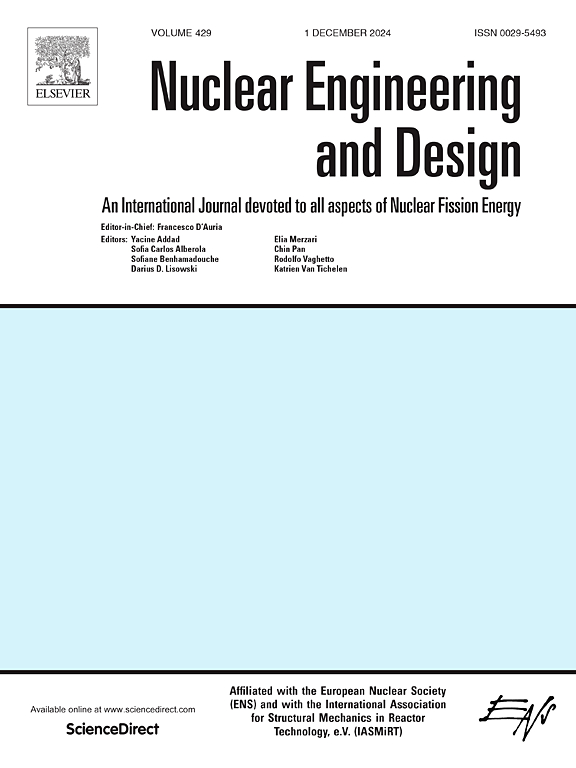LFR related R&D in the Dutch PIONEER program
IF 1.9
3区 工程技术
Q1 NUCLEAR SCIENCE & TECHNOLOGY
引用次数: 0
Abstract
The Netherlands is preparing for an expansion of its nuclear energy generation capacity with two or even four large light water reactors and possible deployment of small modular reactors. In order to ensure nuclear energy generation capacity not only on the short term (the 21st century) but far beyond that, closing the fuel cycle and making much more efficient use of the earth’s natural resources is a requirement. There are different routes towards closing the fuel cycle. In this paper, the R&D activities on liquid metal fast reactors and in particular lead fast reactors, performed within the Dutch PIONEER research program, are highlighted.
The design and safety analysis activities mainly deal with thermal hydraulics topics, ranging from system thermal hydraulics code applications to component level CFD simulations. With respect to fuel and material activities, the unique experimental facilities of NRG PALLAS, are being used for R&D activities that can’t easily be carried out at other research facilities. Unique data from various irradiation campaigns are under analysis and dissolution and reprocessing studies for fast reactor fuel are being carried out. Most of the work is embedded in European collaborative framework projects, thus contributing to the European developments on LFR reactor and related fuel cycle technology.
荷兰先锋项目LFR相关研发
荷兰正准备扩大其核能发电能力,建造两座甚至四座大型轻水反应堆,并可能部署小型模块化反应堆。为了确保核能发电能力,不仅是在短期内(21世纪),而且是在更长时间内,关闭燃料循环并更有效地利用地球的自然资源是必要的。关闭燃料循环有不同的途径。本文重点介绍了荷兰先锋研究项目在液态金属快堆,特别是铅快堆方面的研发活动。设计和安全分析活动主要涉及热工水力学主题,范围从系统热工水力学代码应用到部件级CFD模拟。在燃料和材料活动方面,NRG PALLAS独特的实验设施被用于在其他研究设施不容易进行的研发活动。目前正在分析来自各种辐照活动的独特数据,并正在对快堆燃料进行溶解和后处理研究。大部分工作都是在欧洲合作框架项目中进行的,从而促进了欧洲在轻堆反应堆和相关燃料循环技术方面的发展。
本文章由计算机程序翻译,如有差异,请以英文原文为准。
求助全文
约1分钟内获得全文
求助全文
来源期刊

Nuclear Engineering and Design
工程技术-核科学技术
CiteScore
3.40
自引率
11.80%
发文量
377
审稿时长
5 months
期刊介绍:
Nuclear Engineering and Design covers the wide range of disciplines involved in the engineering, design, safety and construction of nuclear fission reactors. The Editors welcome papers both on applied and innovative aspects and developments in nuclear science and technology.
Fundamentals of Reactor Design include:
• Thermal-Hydraulics and Core Physics
• Safety Analysis, Risk Assessment (PSA)
• Structural and Mechanical Engineering
• Materials Science
• Fuel Behavior and Design
• Structural Plant Design
• Engineering of Reactor Components
• Experiments
Aspects beyond fundamentals of Reactor Design covered:
• Accident Mitigation Measures
• Reactor Control Systems
• Licensing Issues
• Safeguard Engineering
• Economy of Plants
• Reprocessing / Waste Disposal
• Applications of Nuclear Energy
• Maintenance
• Decommissioning
Papers on new reactor ideas and developments (Generation IV reactors) such as inherently safe modular HTRs, High Performance LWRs/HWRs and LMFBs/GFR will be considered; Actinide Burners, Accelerator Driven Systems, Energy Amplifiers and other special designs of power and research reactors and their applications are also encouraged.
 求助内容:
求助内容: 应助结果提醒方式:
应助结果提醒方式:


